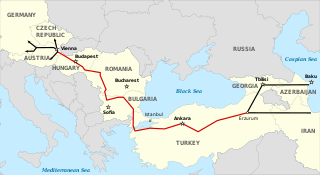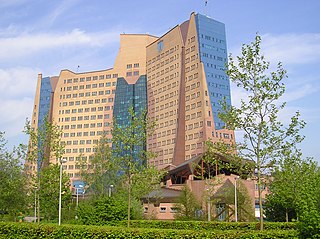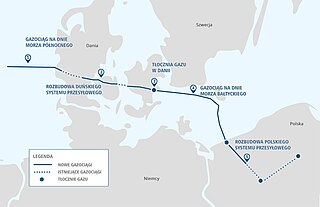
Nord Stream is a pair of offshore natural gas pipelines in Europe that run under the Baltic Sea from Russia to Germany. It comprises the Nord Stream 1 (NS1) pipeline running from Vyborg in northwestern Russia, near Finland, and the Nord Stream 2 (NS2) pipeline running from Ust-Luga in northwestern Russia near Estonia. Both pipelines run to Lubmin in the northeastern German state of Mecklenburg-Vorpommern. Each pipeline comprises two pipes, denoted A and B; each of the four pipes is approximately 1,200 kilometres (750 mi) long and with approximate diameters of 1,220 millimetres (48 in). The combined capacity of the four pipes is 110 billion cubic metres per annum of natural gas.

The Nabucco pipeline was a failed natural gas pipeline project from Erzurum, Turkey to Baumgarten an der March, Austria to diversify natural gas suppliers and delivery routes for Europe. The pipeline was to lessen European dependence on Russian energy. The project was backed by several European Union states and the United States and was seen as rival to the Gazprom-Eni South Stream pipeline project. The main supplier was to be Iraq with potential supplies from Azerbaijan, Turkmenistan, and Egypt.
The BBL Pipeline is a natural gas interconnector between the Netherlands and the United Kingdom.

The Yamal–Europe natural gas pipeline is a 4,107-kilometre-long (2,552 mi) pipeline connecting Russian natural gas fields in the Yamal Peninsula and Western Siberia with Poland and Germany, through Belarus.
The Baltic Gas Interconnector was a 2001 project of a natural gas submarine pipeline in the Baltic Sea between Germany, Denmark and Sweden. The pipeline would connect the existing pipeline networks of southern Scandinavian and Continental European countries in order to secure uninterrupted supply of natural gas.

Nord Stream AG is a consortium for construction and operation of the Nord Stream 1 submarine pipeline between Vyborg in Russia and Greifswald in Germany. The consortium was incorporated in Zug, Switzerland, on 30 November 2005. The original name of company was the North European Gas Pipeline Company. The company was renamed to Nord Stream AG on 4 October 2006.

N.V. Nederlandse Gasunie is a Dutch natural gas infrastructure and transportation company operating in the Netherlands and Germany. Gasunie owns the Netherlands gas transmission network with a total length of over 12,000 kilometres (7,500 mi) and 3,100 kilometres (1,900 mi) long network in Germany.
MIDAL (Mitte-Deutschland-Anbindungsleitung) is a 702 kilometres (436 mi) long German natural gas pipeline, which connects the North Sea with southern Germany. It runs from Bunde, where it is connected with Netherlands gas system, and Emdel receiving terminal, to Ludwigshafen. The pipeline has a capacity of 12.8 billion cubic meters of natural gas per year. It was constructed in 1992–1993, and it is owned and operated by Wingas GmbH & Co. KG.

Wintershall Holding GmbH, based in Kassel, was Germany's largest crude oil and natural gas producer. It was a wholly owned subsidiary of BASF. The company was active in oil and gas exploration and production with operations in Europe, North Africa, South America as well as Russia and the Middle East region. Wintershall employed more than 2,000 people worldwide. In the 2018 financial year the company produced around 171 million barrels of oil equivalent (boe) of oil and gas. Revenues amounted to 4.09 billion euros.

The NEL (Nordeuropäische Erdgasleitung, formerly known as Norddeutsche Erdgasleitung, is a 440 kilometres long natural gas pipeline in Germany.
The Trans Europa Naturgas Pipeline (TENP) is a natural gas pipeline which runs from the German-Netherlands border to the German-Swiss border. It carries North Sea natural gas from the Netherlands to Italy and Switzerland. It also provides natural gas for North Rhine-Westphalia, Rhineland-Palatinate and Baden-Württemberg federal states.

South Stream was a canceled pipeline project to transport natural gas of the Russian Federation through the Black Sea to Bulgaria and through Serbia, Hungary and Slovenia further to Austria. It was never finished.

The Baltic Pipe is a natural gas pipeline between Europipe II and Poland. It is a strategic infrastructure project to create a new European gas supply corridor.
Ruhrgas AG was the largest natural gas transportation and trading company based in Essen, Germany. The company was founded in 1926 and it finally ceased to exist on 2 May 2013 when it was merged into E.ON Global Commodities SE.

Gazela is a natural gas pipeline in the Czech Republic. It is operated by Net4Gas, a company owned by Allianz Capital Partners and OMERS Infrastructure. The project costs around €400 million.

The MEGAL pipeline is a major natural gas pipeline system in southern Germany. It transports natural gas from the Czech–German and Austrian–German borders to the German–French border.

Haidach gas storage is an underground natural gas storage in the town of Haidach near Salzburg, Austria. As of the end of 2018 with a capacity of ~2.9 billion cubic meters (bcm) it is the third largest gas storage facility in Central Europe.
TurkStream is a natural gas pipeline running from Russia to Turkey. It starts from Russkaya compressor station near Anapa in Russia's Krasnodar Region, crossing the Black Sea to the receiving terminal at Kıyıköy.

Nord Stream 2 is a 1,234-kilometre-long (767 mi) natural gas pipeline from Russia to Germany running through the Baltic Sea, financed by Gazprom and several European energy companies. The construction of the pipeline started in 2011, to expand the Nord Stream 1 line and double annual capacity to 110 billion cubic metres. It was completed in September 2021, but has not yet entered service. Planning and construction of the pipeline were mired in political controversy over fears that Russia would use it for geopolitical advantage with Europe and Ukraine.















